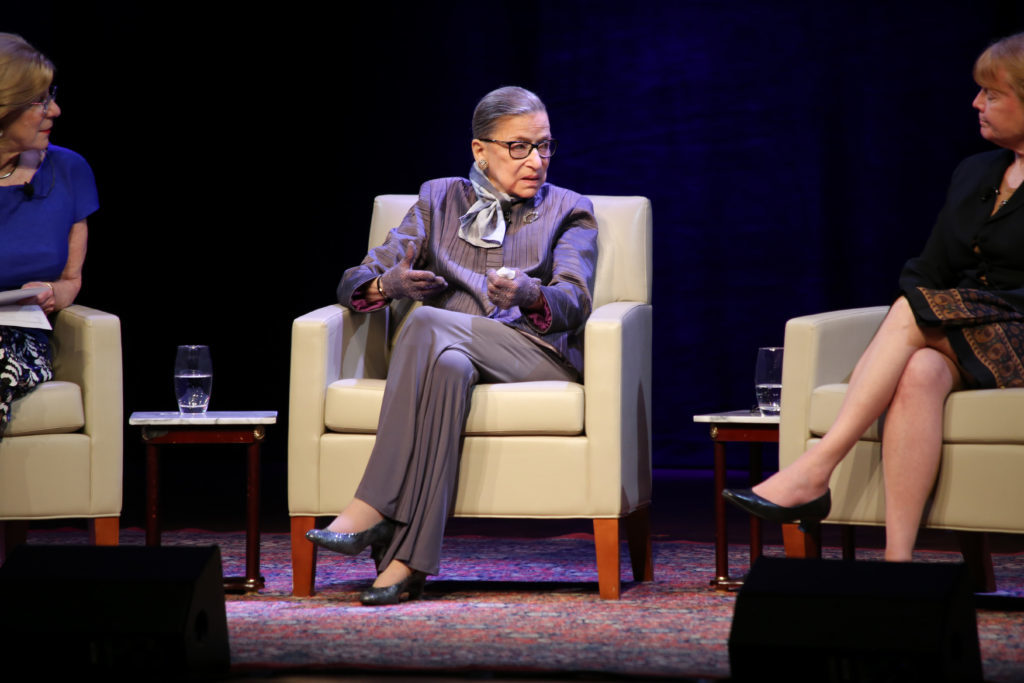Updated: Feb. 24, 2017 at 2:10 p.m.
Supreme Court Justice Ruth Bader Ginsburg spoke to a packed Lisner Auditorium Thursday afternoon about her new book, “My Own Words,” which tells stories from her personal life and marriage, her responsibilities as a Supreme Court justice and the struggles she has faced as a woman in the legal profession.
Joining Ginsburg were contributing authors of the book Mary Hartnett and Wendy Williams, who are both members of the Georgetown University Law Center.
The event, which was moderated by NPR correspondent Nina Totenberg, was hosted by the Newseum.
Couldn’t swing a ticket to the sold-out event? Here are some highlights:
1. A woman in the courtroom
Ginsburg spoke at length about her early days in the legal profession where, even though she graduated first in her class from Columbia Law School, she struggled to secure a clerkship as a woman and mother. She said she remembered one particular case where she had to argue her case to a group of male justices.
“I was terribly nervous,” she said. “I knew that I was speaking to men who didn’t think there was any such thing as gender-based discrimination. My job was to tell them that it really exists, and that you wouldn’t want the world to be that way for your granddaughters.”
Ginsburg said one of her most important contributions as a justice was writing the majority opinion for the decision in United States v. Virginia, ordering that the Virginia Military Institute could no longer refuse to admit women.
“It was uplifting, exhilarating to see these young women,” Ginsburg said about her most recent visit to VMI’s campus. “One of the young women that we talked to was in the engineering school. Another was studying nuclear science. They lived in the same cramped quarters as the men.”
Ginsburg added that when she first got the position, she did not like when others would comment on how small she looked next to the eight male justices.
“Now I have seniority, so I sit closer to the middle, and there are three women on the court who look like they’re here to stay,” she said.
Sandra Day O’Connor, now retired from the Court, often acted as a mentor and “big sister” during her earliest years, and had an enormous influence on how Ginsburg conducts herself today, Ginsburg said.
“Anything that came her way, she just handled it,” she said. “She just did it.”
2. Dedication to the court
Well-known for her personality and outspokenness, Ginsburg said she has never been afraid to voice her disagreement or personal opinions during Supreme Court hearings.
“I have a collar that I use when I’m announcing the opinion of the court. It’s gold and various colors,” she said. “And then I have a collar when I am in dissent. And that one: black.”
Ginsburg said she has never missed a day of work, even during her multiple fights with cancer and period of grief from the loss of her husband. Her struggles in life, she said, push her drive forward in the courtroom.
“When I had my first cancer bout and was about to go into surgery, Justice O’Connor’s advice to me was to schedule surgery on a Friday so I could be back on the bench after the weekend,” she said.
Many proponents of a liberal court have worried about Ginsburg’s health since President Trump won the election in November. However, she said she was in excellent health even though she is almost 84.
“I’ve said many times that I will do this job for as long as I am able to do it full steam. When I can’t, that will be the time when I step down,” she said.
3. Handling fame and influence
Ginsburg said that she is proud of the role model status she has in shaping the minds of young people.
She said that the experiences of being in the minority as a woman and still being able to change the opinions of others that makes fighting for her beliefs so important.
When asked about being a cultural icon, Ginsburg said she was particularly enthusiastic about comparisons made between herself and rapper Biggie Smalls – admirers often call her “Notorious RBG.”
“People ask me if I am uncomfortable with a name like the Notorious B.I.G. Why should I be uncomfortable? We have a lot in common,” she said. “We were both born and bred in Brooklyn, New York.”





